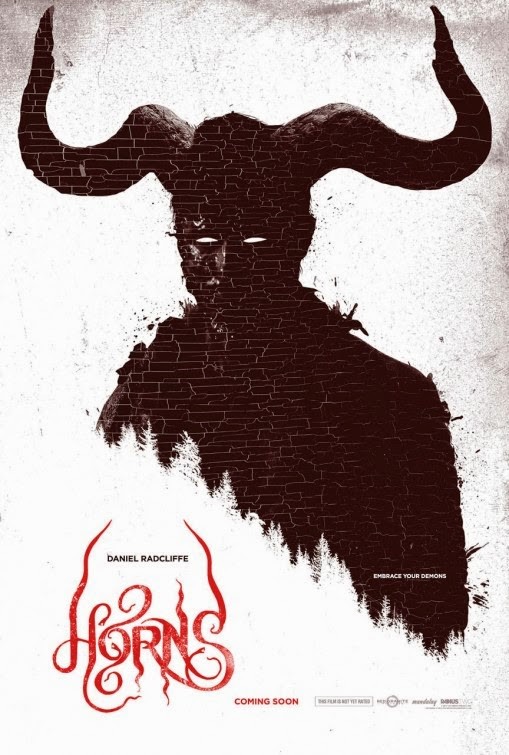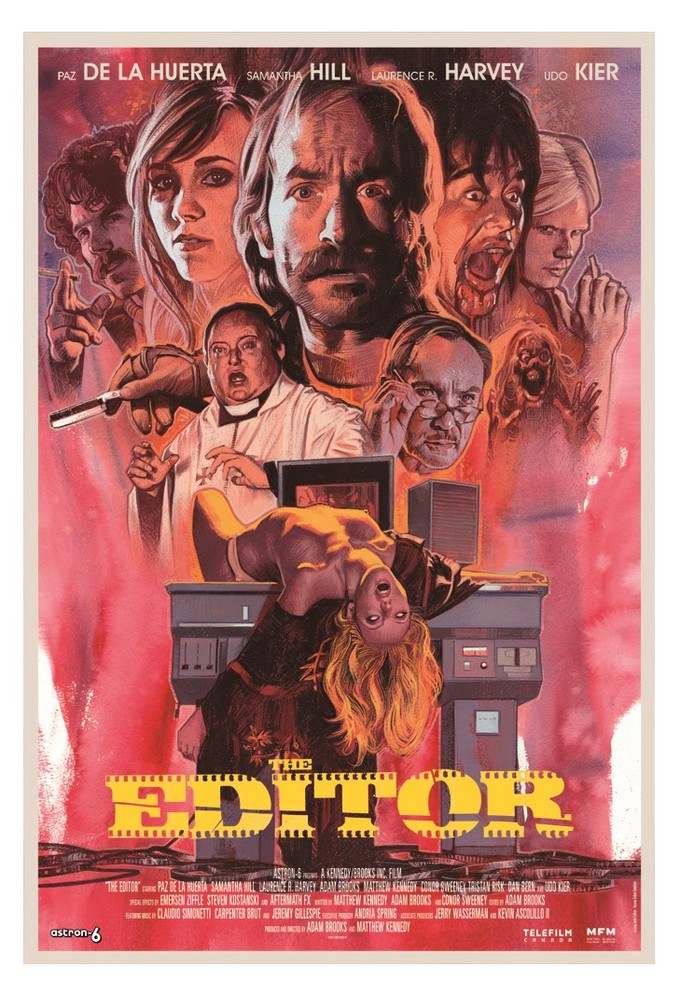Beyond Fest is in its second year of genre programming at the Egyptian Theater in Hollywood, and this year they've got a ton of cool stuff lined up. There's a sold-out screening of HALLOWEEN on Wednesday with both John Carpenter and Jamie Lee Curtis in attendance. The guys from The Meltdown, Jonah Ray and Kumail Nanjiani, are hosting a screening of THE MONSTER SQUAD on Friday, complete with Q & A with Fred Dekker. There are also a ton of L.A. premieres happening in the Egyptian's smaller Steven Spielberg/El Rey Theater (dubbed "The People's Theater" for the fest), including ABCS OF DEATH 2, THE TOWN THAT DREADED SUNDOWN, R100, and most excitingly for me, 2 screenings of LOST SOULS: THE DOOMED JOURNEY OF RICHARD STANLEY'S ISLAND OF DR. MOREAU.
By the way, everything playing in the aptly-named "People's Theater" is 100% ABSOLUTELY FREE. All you gotta do is show up about an hour and a half before the showtime.
Tonight the fest is playing V/H/S VIRAL: for that one you have to pay, but there are still tickets for the 7:30 show if you feel like checking that out.
Anyway, here's a look at the first two films of the festival, Alexandre Aja's HORNS and Adam Brooks and Matthew Kennedy's THE EDITOR.

HORNS
Alexandre Aja's HORNS is a bizarre little fucker of a film.
It clearly strives to be serious, putting you in the shoes of a young man falsely accused of murdering the love of his life. We watch Ig (Daniel Radcliffe) bumble around his hometown as the townsfolk shun him for what they think he did to his childhood girlfriend, Merrin (played in flashbacks by Juno Temple), even though he insists he's innocent. His parents (James Remar and Kathleen Quinlan) back him up both emotionally and legally, but he suspects they think he did it, just like everybody else. Even though his older brother and best friend (Joe Anderson and Max Minghella), respectively, try and placate him with assurances that everything's gonna be okay, Ig's hollowed out and dead inside, even more angry that his girl was taken from him than that everyone thinks he did it.
Then the absurd elements start trickling in one by one. First, horns sprout out of his head during a one-night-stand with a sympathetic childhood friend, who doesn't seem to think it's that big of a deal.. Soon after, everyone starts telling him their dirty little secrets; a mother ponders silencing her nagging baby for good, an old pal confesses his lifelong homosexuality, his parents tell him they'd be happier if they never saw him again, stuff like that. Eventually, people start acting out their dark fantasies around him, gorging on junk food, spontaneously beating up business rivals, and torching a building for the insurance money. Then snakes start trailing Ig wherever he goes. Shit's clearly getting a little bizarre, and not necessarily in Ig's favor; it becomes clear that even his loved ones don't really want him around, and everyone else outright hates his guts.
Despite it all, Ig sees a window: to use these "powers" to find out, once and for all, who killed his beloved Merrin.
The trappings make it seem like a comedic gothic horror, but it's actually a little softer in nature than that. There's a ton of emphasis on the love story between Ig and Merrin. Unlike the snippets of Eric Draven and his beloved Shelly we got in THE CROW, Aja spends pretty much the whole first act of the film setting up the couple's relationship, from its childhood inception to becoming a full-fledged adult romance to the rocky, fateful night when Merrin met her demise. Radcliffe and the rest of the cast (including a perfectly morose David Morse) also bend over backwards to get across just how perfect and amazing Merrin was, and how tragic her loss was. It gets to the "We get it," point fairly quickly, but Aja seems to think of the film as a doomed love story, even if one of the lovers is in the ground at the beginning of the narrative.
Which could be fine, if the black comedy absurdity of Ig's "demonification" didn't come at a direct contrast with the sincere tone of the romantic stuff. When people start confessing their sins to Ig, the film becomes a vaguely TWIN PEAKS-esque satire: the town is filled, top to bottom, with double faces and ulterior motives. It takes one or two moments of pure honesty from each person to show that they're completely and utterly full of shit the rest of the time, and many of them admit to resentments and demons that are truly nasty and dark, but it's all played for laughs. Heather Graham plays a waitress who claims to be a witness to Merrin's murder, but when pressed by Ig, she gleefully admits to fabricating the lie to get her name in the papers ("I've always wanted to be on the cover of Us Weekly!"). Ig tells a group of reporters that he'll give an exclusive interview to whoever beats the shit out of the rest…cue a comically massive mosh pit of brawling newsmen. This black comedy angle is actually the section of the film I liked the most, and it actually does a decent job of straddling the tragicomedy tones once Ig's powers first start manifesting.
But once the extent of Ig's powers become clear to him (and the audience), the film turns into strictly melodramatic territory as Ig tracks down and confronts those responsible for his lover's death. So all of you wondering whether that horned Daniel Radcliffe adorned with jewelry and snakes was meant to be serious, I'm telling you, yeah, it kinda is. There's serious discussions, both in the dialogue and the subtext, on subjects like sin, purity, true love, devotion, loyalty, and filial piety, and its sandwiched with stuff like the aforementioned reporter free-for-all and Radcliffe joking that he's "fucking hard to kill". The tonal gymnastics don't really work, and it's a shame. We've seen Aja go mostly-serious in HAUTE TENSION and THE HILLS HAVE EYES, and we saw him take a piss in PIRANHA 3D, but here, he tries and fails to bridge the two sensibilities.
Despite a few really strong performances (Remar, Morse, and Anderson get one powerful dramatic moment each) and moments (the stretch where Ig discovers his powers has a few really big laughs), HORNS doesn't really come together into something greater than the sum of its parts. The Ig/Merrin romance is thin and drawn out, and the labored religious symbolism and oh-so-typical fisticuffs of the finale come at the cost of the satirical comedy that worked so well earlier. Radcliffe was brave to take this complicated, vengeful role as part of his post-Potter rollout, but his lovestruck angel of vengeance act doesn't clue us in to any new side of his talents. Aja didn't write this one, and it won't win him many new fans, but I can't help but think this script would've benefited from a once-over to smooth over the tonal inconsistencies and thin characterizations. There is good stuff within this movie; the stretch where everyone's confessing to Ig has a dark satirical energy, and one gory black comedy gag late in the film had me HOWLING. I just wish the rest lived up to its high points.

THE EDITOR
THE EDITOR was made for us giallo fans.
I'm not saying being well-versed in the slasher genre perfected by Argento, Bava, and Fulci is a prerequisite for enjoying the flick. My wife knows next to nothing about those films, yet she had a blast. But to get the full impact of Adam Brooks and Matthew Kennedy's homage to the baroque Italian horror films of the '70s and '80s, it helps to have at least a cursory knowledge of their tropes, their aesthetic, and their unique, dream-like quality.
This is because this flick feels more like a genuine giallo than anything I've seen in quite a while, including the contemporary work of Mr. Argento himself. And it does so while taking every chance it possibly can to nudge the ribs of those surreal, bizarre horror flicks.
The story is right out of Horror 101: Ray Ciso (Brooks) is the titular editor, a sad sack with a wooden hand and a big ol' Italian moustache, who has been tasked with cutting together a cheeseball horror flick. The opening is a direct bite from BLOW OUT: a death scene is played totally straight until the last shot reveals it to be an in-progress scene from a generic slasher. With an overbearing producer, a screentime-hungry wannabe hunk, and his alcoholic, former starlet wife (Paz De La Huerta) breathing down his neck, he's starting to come apart at the seams. And out of sheer, utter coincidence, someone's going around killing various cast and crew members who seem to be giving Ray the most trouble. Weird, huh?
The first thing you notice about the film is how hard the filmmakers have worked to replicate the aural aesthetic of the classic giallos. From the high contrast lighting, to the right-up-in-there framing, to the purposefully out-of-sync English dubbing, THE EDITOR never lets up in its devotion to replicating the mood and feel of the movies it pays homage to, and that dedication is quite charming. Thankfully, the joke never wears thin; it reminds me of BLACK DYNAMITE, in that it finds a nice balance between deconstructing the sillier aspects of these genre films while staying just sincere enough to function as an actual genre film itself.
Many of us forget how silly even the best of the giallo flicks could be. Think of the barbed wire room in SUSPIRIA, the spider death in THE BEYOND, and the simian-enhanced climax of PHENOMENA; even if you argue that they are played dead straight (which I wouldn't), you can't deny that all those films have scenes, moments, and characters that are heavily stylized and occasionally inexplicable. That is not a knock on those films. In fact, these bizarro elements, and the "anything goes" vibe they help create, are a huge part of what I love about the genre. Brooks and Kennedy are smart in that they don't embellish too much on the tried-and-true style of the Italian horror scene, knowing that playing it straight to contemporary audience will get enough laughs.
And, boy, is this flick funny. Even though it never goes into full BLAZING SADDLES soundstage-trampling mode, pretty much every scene is at least somewhat played for laughs. Sometimes it's inherent to the devotion to giallos: it's never made explicit, but THE EDITOR is clearly meant to feel like a flick shot in the late '70s/early '80s and dubbed (poorly) into English. That means references to Betamax, absurdly overdone clothes, hair, and mustaches, and a big fat Moviola for Ray to edit on. There's a running thread of casual misogyny that seems utterly ridiculous (and hilarious), but is only very marginally removed from how these types of movies portrayed male-female relationships. There's a barking police captain, a sex-hungry aging starlet, and a frightening, accented psychiatric doctor (obviously played by Udo Kier), and these cliches are mined for every laugh that they're worth while never winking at the audience in a SCARY MOVIE or Friedberg/Seltzer type of way.
So yeah, maybe this movie is kind of a joke, but its a funny joke that doesn't wear out its welcome, and the filmmakers are dead-committed to seeing it through to the end. It's really, really hard not to be charmed by their dedication and clear-as-day love for the material.
Non-horror geeks will probably enjoy the film for its bizarro laughs and outlandish kills, but for fans of Argento, Fulci, or giallo films in general, this is a must-see; Brooks and Kennedy clearly have the same sort of love for the genre that many of us have, and they've painstakingly crafted one more entry for us to giddily consume.
